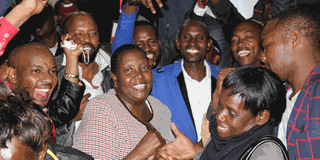Peris Tobiko: A portrait of power and poise

Peris Tobiko and her supporters celebrate in Isinya after the announcement of a repeat nomination exercise, on May 19 showed she had more votes than Mary Seneta. PHOTO | JOSEPH NGUNJIRI | NATION MEDIA GROUP
The Jubilee nomination contest for MP in Kajiado East was always going to be an interesting one to watch. Two women were front runners in the quest for leadership position in a community known to be intensely patriarchal.
Kajiado East MP, Peris Tobiko was going head to head with Mary Seneta, the Kajiado woman representative. Such was the intensity of their rivalry that Julius Ntaiya, the other Jubilee aspirant in the contest, was completely overshadowed.
When the results were announced, he came in at a distant third, having been whitewashed by the two women.
Actually, the talking point has been that Ms Tobiko made history by becoming the first woman to be elected into leadership position in Maasai land.
When she got into the race in 2013, after Kajiado East was hived off the greater Kajiado North, the men contesting against her thought they would easily bump her off the contest.
MAASAI CULTURE
They, rather naively, reckoned that they would easily use Maasai culture to fight their political battles.
During campaign time the male aspirants started spreading vicious propaganda to the effect that it is unheard of for a woman to lead men.
That was not all, the male aspirants latched on to the fact that Ms Tobiko’s husband hails from Narok and were using that ask her to go and vie there. When it became apparent that those lines of attack were not working, they resorted to more desperate measures.
A group of Maasai elders were reported to have performed a ritual aimed at cursing Ms Tobiko for ‘defying’ Maasai culture.
When the final tally of the 2013 TNA nominations was done, Ms Tobiko had wiped the floor with the other seven male contestants. She went ahead to win the seat, beating ODM’s Kakuta Maimai in the General Election.
NON-MAASAI POPULATION
It should however be noted that the potency of the cultural threats on Ms Tobiko were significantly blunted by the fact that Kajiado East, which consists of Kitengela and Isinya towns, is home to a significant population of non-Maasai. These people were unmoved by the cultural road blocks being placed on Ms Tobiko’s path and went ahead and voted for her.
Longton Jamil a businessman and community leader in Kitengela explains that the huge block of migrant voters in the constituency identified defied tribal pigeon holing and cast their lot with Ms Tobiko as they identified with whatever she was being subjected to.
“The fact that she was being viewed as an ‘outsider’ by virtue of her marriage brought her close to the immigrants who are also ‘outsiders’.
Besides, these people come from areas where women are elected as leaders so they did not see any problem with (Ms) Tobiko’s candidacy” says Mr Jamil.
PATRIACHAL SYSTEM
Perhaps buoyed by Ms Tobiko’s trailblazing example of defying a patriarchal system, Ms Seneta also decided to throw her hat into the ring and challenge the latter for the seat. Ms Seneta, by virtue of occupying the affirmative-action inspired woman rep position, was seen as a lightweight when contrasted with the fire-eating Ms Tobiko.
Ms Seneta proved her critics wrong by proving her mettle on the campaign trail. Though she would hate to admit it, Ms Tobiko was given a real scare by the former school teacher. The Kajiado woman rep has thrice petitioned Ms Tobiko’s win during the nomination; twice at the Jubilee Party Appeals Tribunal and once at the Political Party’s Tribunal.
It is worth noting that neither of the two women took the cowardly route of registering as independent candidates; they waged their war while firmly embedded inside Jubilee. During campaign time it became clear that the two women have near-fanatical following in Kajiado East.
ELDERS CURSE
Looking back Ms Tobiko says that the incident that saw cultural elders curse her was one of her lowest moments. There were fears she would even die as a result of the ‘curse’. “Our people have seen elders’ words come to pass; not many people were willing to tempt fate. I lost a good number of my supporters,” she says.
It is her Christian faith that kept her going. A fortnight after the cursing ceremony, she rallied her supporters and pastors and pitched camp at the same venue for a cleansing ceremony. On the plus side, her altercation with the elders saw her gain sympathy votes. She is however quick to point out that she respects her Maa culture. “It is just that there are retrogressive practices that need to be discarded in favour of more positive ones,” she says adding that traditionally women are the ones who build houses, which in itself is a form of leadership.
Ms Tobiko has endured not-so-rosy relations with her culture. She thrice escaped being married off before finishing her studies. The first time was just before she sat her CPE exams and twice when she was in secondary and high school.
The mother of four is married to a banker she met at the University of Nairobi, where she did a course in Political Science. And she is not new to leadership, having served as a DO in Embu after graduation.




